Vampires. Anime absolutely loves vampires. From Monogatari to Jojo, Mars Red to Vlad Love. Something about this western monster has captured Japan’s imagination so much that we see it absolutely everywhere. Some try to play it straight, going for a horrific, tragedy stricken tale. Others lean more into the romantic side, the tragic and highly sexualized monster. It is in between these two that we find Yofukashi no Uta. Brought to you by the same mangaka who created Dagashi Kashi, Kotoyama, animated at “LIDENFILMS” and directed by Tomoyuki Itamura of Monogatari fame with Tetsuya Miyanishi overseeing as chief director, Yofukashi no Uta straddles that vampire line. It tries be about the romance while letting the horror peek in around the edges. To be both an exploration of humanity through the monster, as well as a sweet romantic treat. The question is: Does it achieve both? Or neither? Lets find out.
Be warned, this review contains minor unmarked spoilers for Yofukashi no Uta. It also contains major spoilers in some sections however these will be heavily marked to avoid accidents.
Narrative
Narratively, Yofukashi is in this really weird place. It has an overarching plot, a time limit, stakes, there is a semblance of focus. And yet… it meanders through it’s story like a snake through the brush. The characters have the agency to move things along, to take definitive action. All they have to do is step towards that end goal. Yet they don’t. Instead it’s like Yofukashi actively avoids engaging with it’s story, at least until the end. In some ways, this makes sense. The core of the narrative is about a young and indecisive teen figuring out what he wants from life, eventually deciding to be a vampire by falling in love with one. Of course he’s going to be indecisive, he doesn’t know what he wants. But just because it makes sense for the character doesn’t mean it makes a good experience for the audience.
This issue is only exacerbated by Yofukashi’s split focus. It can’t decide if it wants to be a mushy romance all about exploring relationships through the metaphor of humans and vampires or more of a “Vampires are monsters” horror-adjacent thriller. Early on it does a decent job of the former. We see why Ko wants to become a vampire and how it might not be everything he initially thought it was. These vampires, just like Ko at the start of the story, are lonely people. They lack meaningful relationships. And Yofukashi explores this through some of it’s cast. Not all of them, but we will get to the issues there later. The only problem with this side of Yofukashi’s coin is that there isn’t any real conclusion. In fact I would go so far as to say that this part of the show doesn’t even truly begin until the finale.
Meanwhile on the latter side, Yofukashi barely dedicates any time to being a thriller despite clearly wanting what comes with that label. It establishes rules, theoretical governing bodies of vampires, human retaliation, etc. It tries, through the eyes of one of the side characters, to present vampires as predators on monsters. And again, Yofukashi does a decent job at it! I would wager these were some of my favorite episodes of the entire show. But just like with the romance side, there’s no actual conclusion or progression here. Yofukashi starts to explore this idea so late in the show that it can’t do more than just introduce it. On top of that, these two sides don’t interact as well as Yofukashi no doubt wants them to. Its hard to see the Vampires as monsters, or take them seriously as a threat, after you dress them up as maids and nurses.
Basically what I’m saying is this: Yofukashi splits its focus between being a romance and a thriller, spending to much time attempting to establish both despite their competing tone, and in doing so fails to conclude either in a satisfying way. Neither the romance nor the vampire thriller have any sort of conclusion. So while the journey was decent fun, the individual episodes occasionally engaging, the overall narrative is lukewarm at best. There’s no impact to it, nothing particularly memorable or satisfying. It’s like a Slice of Life in that regard, except with vampires and late nights. Forgettable.
Characters
Moving on to the cast, Yofukashi fares a bit better here. For such a short show, Yofukashi has a decently sized roster with 2 leads and a full 11 named supporting characters. Each one of them with their own place in the story and issues to be resolved. Some of them, like Akira or Seri, are used well. They get entire episodes dedicated to their place in the narrative while also appearing across the rest of the season as supporting characters in other peoples stories. They get just the right amount of attention to feel important and meaningful in the story, their relationships with the leads representing something unique to them. However other supporting characters, like Nico and Kabura, aren’t so lucky. They end up spending their time just sitting around taking up space. Only offering a few lines of dialogue before once again disappearing from the story.
In the grand scheme of things this isn’t that big a deal. Not every character has to be important and, by and large, Yofukashi does a decent job spreading out the attention. The issue for me more comes in what Yofukashi promised with these characters existence, and then failed to deliver on. And this ties back to my old argument about vampires and what they represent in this story. For you see, roughly half way into the series Yofukashi introduces a few more vampire characters. I won’t go into details, don’t worry no spoilers, but they do exist. These characters then promise a sort of… look into vampire society at large. How they view and interact with humans. And we don’t really get that. The one-off character stories are nice, I really enjoyed the like… two that we got. But Vampire the Masquerade, this is not.
Luckily Yofukashi does have one big saving grace to this oh so glaring issue… Yes that’s sarcasm, they aren’t that big an issue, anyways the lead characters are great! Nazuna and Ko’s relationship is really what carries the show for me. This isn’t your usual one-way, lifeless romance where they stumble through the show together until happenstance forces them together. I mean… That sort of happens by the end, but even that is driven mostly by their own decisions rather than bullshit drama. Nazuna acts to draw Ko out of his shell and get him to enjoy the nightlife, slowly letting him become his own character more and more. Meanwhile Ko becomes this source of joy and novelty for Nazuna, who had long since lost interest in the night and was just going through the motions. They revitalize each other’s worlds, and it truly is a joy to watch unfold.
So what I’m saying is this: The lead romance of the show, the most important part of Yofukashi, is strong and engaging. So while the side characters might leave something to be desired with their individual stories, outside of two who I almost like more than the leads to be frank, I would still say Yofukashi’s cast has plenty to like.
Visuals
With that we finally come to the production side of things, and here I can be a bit more positive. Because personally? I think Yofukashi looks pretty good. It doesn’t move much, Yofukashi is not an action heavy, sakuga-filled kind of show. It has a few scenes here and there for that, but overall its OP moves more than the show does. Instead where it’s strengths lie are it’s color palette and overall aesthetic. Yofukashi’s use of neon, from the foreground and background all the way to its characters, is absolutely beautiful. The way the bright colors contrast against the dark blues and purples of the night. How rich and vibrant the city streets become as lights and colors cover the screen. Yofukashi produced more home/lock screen and computer wallpapers each episode than most shows this season did their entire run. And that’s not even the best part.
The best part, for me, is how Yofukashi uses these colors to inform the characters. When Ko is new to walking the night, experiencing everything for the first time, it’s bright and vibrant beyond belief. But as he has his ups and downs the colors and saturation shifts to replace that. When a scene is dominated by a single emotion, or emotions in general run high, the color contrast shoots up. Sometimes it bathes the entire scene in a single color, though that’s not always a good thing. What I’m saying is that the colors used shift based on the characters involved. There is one character for instance, introduced later on, who saps the life and vibrancy out of any scene she is in. Not because she’s bad, she’s my favorite in fact. But her presence is bad for the characters, and the colors reflect that.
There’s one downside to all of this however. Sometimes Yofukashi overdoes it. Remember when I said that sometimes it will bathe entire scenes in a single color to get emotions across? Well about 80% of the time it attempts that, it looks like trash. Whether it be a piss-yellow filter over the entire background or washing the screen in purple, it ends up removing any depth and detail from a scene. Just take a look at this wide shot from episode 6 for an example, don’t worry there’s no spoilers in it. You can barely tell where this is or what’s going on. Characters don’t match the scenery at all, and the compositing is garbage. These kinds of color-shifts are rare so they aren’t a huge issue, and I do appreciate what Yofukashi is trying to do with them. But they only end up taking you out of the moment
Still, even with these occasionally once-an-episode color washes, Yofukashi is one of the best looking shows of the season. It’s neon color palette is vibrant and striking, making most screenshots easily identifiable and it one of the more memorable aesthetics of the year.
OST/Sound Design
Finally we come to the OST and Sound Design, easily my favorite part of Yofukashi. Though looking at who did the music, Yoshiaki Dewa of Nagi no Asu Kara, that shouldn’t be much of a surprise. Yoshiaki manages to almost perfectly capture the feeling of *Yofukashi’s world and characters. It sounds exactly like what you would think just by looking at the promo image. It is, in a word, rhythmic. To put it in a few more words though, I would call it primarily club music with some funk, classical and a bit of relaxing guitar thrown in to round it out. While it does have that variety however, it is primarily club. Thumping beats, consistent rhythms, heavy drums or bass guitar. Yofukashi’s music is the kind that makes you want to bob your head or dance along to the beat.
Lets take a look at a few tracks to give you a good idea of what I’m talking about. From “Night Flight” (1:28:25) to “Blue Night” (6:38), “Envy” (51:53) to “Mote Power” (30:56), Yofukashi is filled with drums and heavy beats. Some of these lean more towards the classic thumping club music while others are more energetic, almost childlike in their fun. Yofukashi even manages to work in experimental, almost trance-like beats such as “Blood Sucking” (4:58), as well as darker, heavier beats like “To the Night World” (0:00). The point is, while Yofukashi can be said to lean primarily on its rhythm, the variance in style and speed of that rhythm across its entire OST is something to be praised. There are very few tracks that feel like just generic ambiance. That said, they do exist.
Tracks like “Bad Blood” (44:19) and “Night Swing” (24:16) sound like every other basic ambiance track you can find on Youtube if you search for “Dark ambiance music”. They are forgettable and uninspired. Meanwhile on the flipside while I’m all for inspired and unique attempts at music, they don’t always work. Stuff like “Nanakusa Nazuna’s Theme” (2:50), or “Friend” (22:13), just come off as discordant and unpleasant. I imagine they were supposed to evoke feelings of discomfort and unease in the listener, designed to support specific scenes and feelings. But all they ever did, even when I heard them in the show, was take me out of the moment and make me wonder “What the hell am I listening to?”. Luckily these moments, and tracks, are few and far between.
As for those who don’t like club, or want a bit more variety? Yofukashi has you there to. Stuff like “First Kiss” (17:52) and “Its Early Morning” (15:53) give you slower, more relaxed tracks to chill with. Meanwhile my favorite track, “Welcome” (34:57), melds Yofukashi’s signature beats with more classical string instruments to create this incredibly satisfying representation of ancient vampires in a modern world. What I’m saying is that, despite a few forgetful tracks in a 2 hour long suite, Yofukashi has a fantastic OST. One of the better ones of the year. In fact I might go so far as to say I liked it more than I did Made in Abyss’s OST, but don’t go telling those fans I said that. It can stay our secret in this review.
That leaves that sound design which… I will admit I am not the best person to go to for. All I can say is that I never found myself taken out of the show by how it sounded. Which I suppose is the best thing you can say? You know, if they did their job right than no one will notice? Yofukashi isn’t a show that has a whole lot of silence for stuff like footsteps, materials, rustling cloth or weather to stand out in. It’s dominated by dialogue and music, both of which are pretty good most of the time. As such I don’t mind calling this last little bit a “pass”.
The Show With Two Souls
This brings me to the final, and optional, personal section of this review. It’s where I get rid of any pretense of talking about the individual aspects and merits of a show and just dive into my personal experience. Try to give you a look into why I came away feeling like I do about Yofukashi. If you don’t have any interest in that, or you haven’t watched the show, then give this a skip. There’s going to be some massive spoilers in here so considering yourself warned. And if you are interested? Well read on.
So in case you hadn’t guessed it by this point, I was very torn on Yofukashi. It has two really decent, dare I say almost good, sides. The first is the romance side, though why I call it romance when there is barely any in it I don’t know. It’s really more about relationships, romantic and platonic. How people connect and interact with each other. From outcasts bonding over their shared circumstances to a simple desire for platonic friendship, no messy romance involved. There’s even an episode all about the desire to be desired. That feeling of being wanted by other people. There’s some really good stuff in here! In fact my favorite episode of the season takes place in here, that being Seri’s whole bit about wanting to connect with someone as just friends rather than anything sexual. It was great!
However the issue comes up with Yofukashi’s 2nd half, that of the vampire thriller. This also has its moments! Those small scenes of threat and danger, where you truly get to see them show their fangs. And Anko, the vampire hunter, is one of the most engaging characters of the show. I love the way she proactively prevents Ko from interacting with the vampires, how strongly and succinctly she argues that vampires are monsters, not people. This focus not on who the vampires are but what they do, and how not everyone going into it willingly. There’s some good stuff here to. So… Why am I so torn on the show if these two sides are, individually, not half bad? Because I don’t think they play together nicely.
Yofukashi introduces this idea of vampires internally governing themselves, with rules, laws and consequences. Only those consequences end up being used for nothing more than forcing our leads together rather than allowing them to grow together organically, though even that’s not that bad. There’s no exploration or care about their actual dynamics and how they exist within the wider world, yet when Anko shows up apparently there’s some kind of conflict under the surface there. Ko see’s Seri attempt to kill not only him, but someone else as well, right in front of him. Requiring Nazuna to show up and save them both. He watches them cut off each others limbs, get into these big, blood fights. Yet he doesn’t think to question their humanity nor the danger they pose until a starving old man attacks him, rather than some sexy blonde.
While both of these sides exist, and are fine independently, they don’t mesh together well at all. Yofukashi is like watching 2 separate shows, not knowing which you’re going to get each episode. Had it fully dedicated itself to one or the other, had it avoided this sort of tonal whiplash, I think it could have done a lot. Use the vampires as a metaphor for relationships between men and women, or just people in general. Use the classic horror tropes of vampires, disease and implied sexual violence. Make each member of the Vampire Waifu brigade a different kind of relationship metaphor, or instead maybe a different kind of vampire horror convention. Just… Just choose one and go for it. Because right now I don’t know if Yofukashi wants to be horror, romance, or just the Dagashi Kashi author’s vehicle for porn. Though I won’t complain about that last one.
Conclusion
So yeah, Yofukashi stands out for it’s beautiful colors and stellar soundtrack, but is weighed down by its fear of commitment to any one genre or tone. I had good fun with it, I listened to some good music, watched some scary, and sexy, vampire ladies and have a few new wallpaper images to show for it. But will I still remember Yofukashi when Winter 2023 rolls around, with all of its new and shiny series? What about this very season once I post this review and go watch Mob Psycho 100 S3? Odds are… Probably not. Because Yofukashi, for all its pretty lights and sounds, failed to strike any kind of cord to make me remember it as anything more than a seasonal flash in the pan. But maybe that’s alright. That alone is better than like… 90% of seasonal shlock to begin with. So I’ll take it.


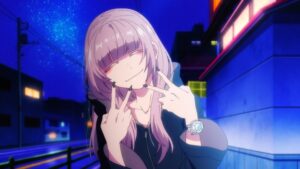

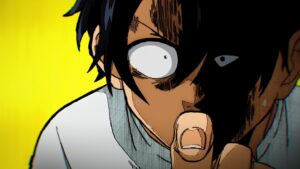

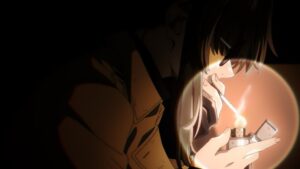
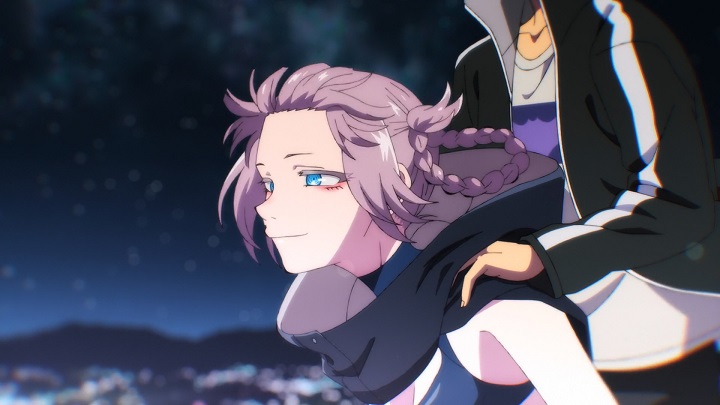
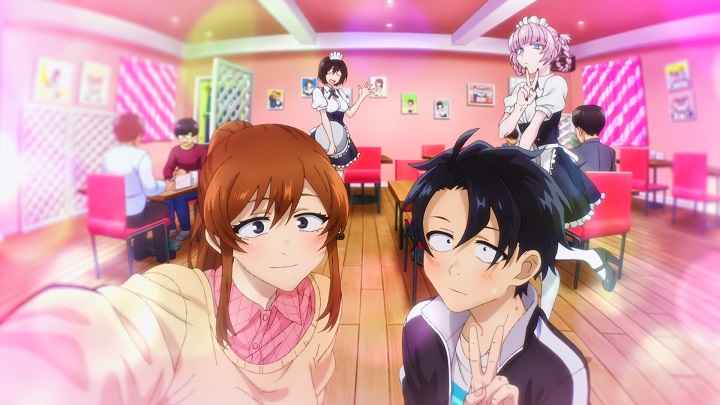
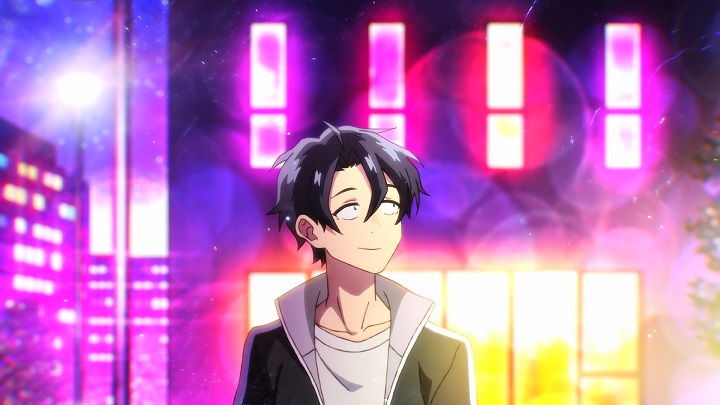
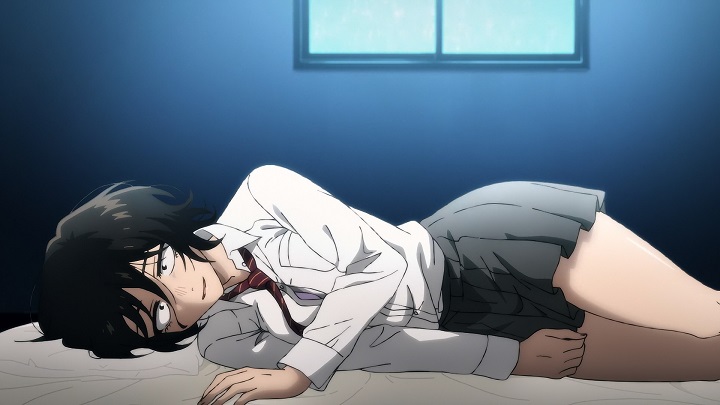
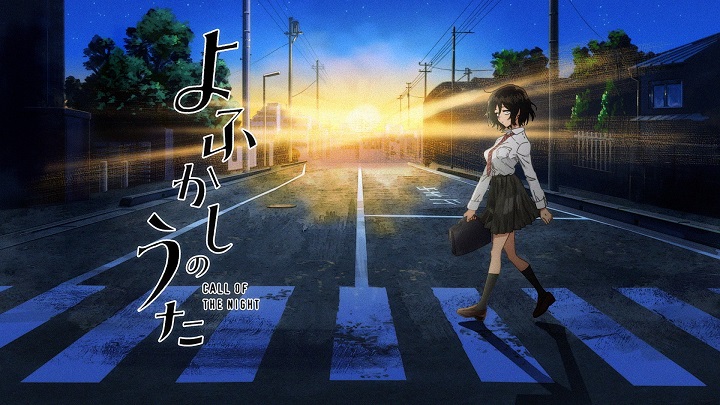
HOW are you going to have a list of vampire anime and include Mars Red, but leave out HELLSING?! ^_^
(I gotta read the rest of the review when I get home)
Cause Hellsing is old and it was, thematically, nothing like the others I listed out. I thought about, I really did. But I couldn’t make it work.
I guess I am the only one who liked this series and actually see its potential. As I may I have said this before the story gets better in the manga. It further explores the cast and the complex relationships between them, the horror is a bit more consistent while keeping the humour in tack. In other words it finds its identity. All the complaints you have were addressed in the manga but since you probably won’t read it and will continue to binge predictable shonen trash and LN garbage than all I can say is your lost.
???
I don’t know how many times I have to say this, nor how many examples I have to give, but I don’t binge Shounen and LN adaptations. You yourself have said I apparently hate Shounen. I’m one of the biggest detractors of LN adaptations on this website. So for the life of me, I cannot understand why you keep bringing this up.
As for it being in the manga, well… If it gets a season 2 then that will be relevant. But I’m not judging this season on the manga. I”m judging it on this season. Do you want me to go read the manga so I can say “The anime was mediocre, but if you go read it then you’ll have a better experience”? That’s just going to make people ignore the anime more.
I honestly do not understand what you want here. If its just a matter of you liking it more than I did well… cool? I’m glad you enjoyed it. I didn’t enjoy it as much. I’d appreciate it if you left it at that and stopped making things up about me.
From some of the reviews I’ve read prior to this one, I imagine a lot of people will agree with your opinion of this show.
That said, I just want to register my violent disagreement. I think Call of the Night is terrific – by FAR the best show I’ve seen this year – and probably among the very best anime of the last several years.
Now that I’ve gotten my biases out of the way, let me explain why I feel this way.
First of all, I would characterize this as more of a story including vampires than an actual vampire story. What it actually is is a coming of age tale, about people trying to figure out where they fit in, and about the importance of conforming (or not) to social norms.
Nazuna may be decades old, but like Ko, she’s also in the process of finding herself. Until they run across each other, both of the leads are lost – Ko, in hitting adolescence and discovering he doesn’t really want to do a lot of what’s expected of a normal teen; and Nazuna, who likewise doesn’t really want to follow the norms of being a vampire. Her life, like her apartment, is pretty empty.
Up until the last couple of episodes, I wouldn’t even characterize the show as a romance. Ko and Nazuna are just kindred spirits, reveling in each other’s company and exploring the unconventional aspects of the night.
Ko’s friend Akira, as I think you concede in your review, complements the story well.
She’s not fitting in either, and is clearly pretty depressed, going to sleep early in the evening, and waking up to head to school in the dead of night. Her interactions in her two-episode character arc show another aspect of someone who’s not quite fitting in, and at the end, when she finally gets a good night’s sleep “in bed” with Ko and Nazuna, it seems that she may be beginning to understand that she doesn’t necessarily have to conform to exactly what society expects of her, either.
I could go on.
For example, the office lady who comes for a massage, but has to leave because her boss is calling her back to work in the middle of the night likewise really complements the theme. She doesn’t seem to hate her job, but she DOES appear to hate the people she works with, and it brings her to tears. For me, Ko offering to turn her into a vampire once he becomes one (“if she wants”) was an emotional highlight of the show.
I agree that not every introduced character gets proper development, but that’s just the cost of trying to cram a long, ongoing manga into 13 20-minute episodes. For me, the writing largely handles these side characters pretty gracefully.
Finally, near the end, the introduction of true horror with the vampire hunter and her nasty, if logical reasoning – conforming is good, conforming is what’s best for you, I’m going to kill the ones trying to convince you not to conform – is a pretty brilliant way of taking the story to this point and providing it with a satisfying end.
Ko and Nazuna have, in the course of 13 episodes, grown up enough to know that neither wants to conform; but more importantly, that they want to do their non-conforming together.
The story is beautifully written, the art direction brilliantly accentuates the on screen happenings, and while I know a lot of people don’t agree, I personally find it hard to understand how anyone could not find this unconventional mix of elements to be really funny, truly whimsical, and, at the end, deeply moving.
Nice to see I am not the only one who likes call of the night. Seems like any8ne who agrees with this review wants to conform. Like Ko and Nazuna I choose to be non conform and do what I want to-do.